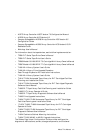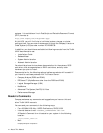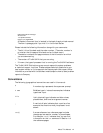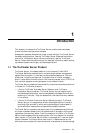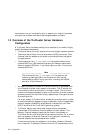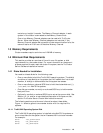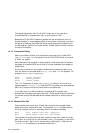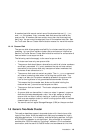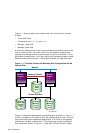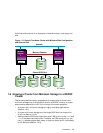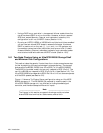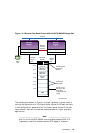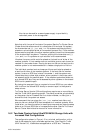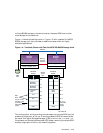A member boot disk cannot contain one of the clusterwide root (/), /usr,
and /var file systems. Also, a member boot disk cannot be used as the
quorum disk. A member disk can contain more than the three required
partitions. You can move the swap partition off the member boot disk. See
the TruCluster Server
Cluster Administration manual for more information.
1.4.1.4 Quorum Disk
The quorum disk allows greater availability for clusters consisting of two
members. Its h partition contains cluster status and quorum information.
See the TruCluster Server Cluster Administration manual for a discussion of
how and when to use a quorum disk.
The following restrictions apply to the use of a quorum disk:
• A cluster can have only one quorum disk.
• The quorum disk should be on a shared bus to which all cluster members
are directly connected. If it is not, members that do not have a direct
connection to the quorum disk may lose quorum before members that
do have a direct connection to it.
• The quorum disk must not contain any data. The clu_quorum command
will overwrite existing data when initializing the quorum disk. The
integrity of data (or file system metadata) placed on the quorum disk
from a running cluster is not guaranteed across member failures.
This means that the member boot disks and the disk holding the
clusterwide root (/) cannot be used as quorum disks.
• The quorum disk can be small. The cluster subsystems use only 1 MB
of the disk.
• A quorum disk can have either 1 vote or no votes. In general, a quorum
disk should always be assigned a vote. You might assign an existing
quorum disk no votes in certain testing or transitory configurations,
such as a one-member cluster (in which a voting quorum disk introduces
a second point of failure).
• You cannot use the Logical Storage Manager (LSM) on the quorum disk.
1.5 Generic Two-Node Cluster
This section describes a generic two-node cluster with the minimum disk
layout of four disks. Note that additional disks may be needed for highly
available applications. In this section, and the following sections, the type
of PCI SCSI bus adapter is not significant. Also, although an important
consideration, SCSI bus cabling, including Y cables or trilink connectors,
termination, and the use of UltraSCSI hubs is not considered at this time.
Introduction 1–5



